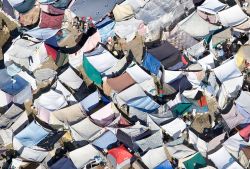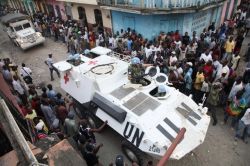Halifax Media Co-op
News from Nova Scotia's Grassroots
The Crush of Lies: Canada, Haiti and the Media
When the Canadian media relentlessly churns out news stories about Haiti on the anniversary of the devastating January 12 earthquake, be skeptical.
An obvious racism lies behind our media’s depictions of Haiti. Black, voodoo-practicing, violent, poor Haitians are destined, it would seem, to be part of a failed stat e due to their inherent corruption. Thus, western nations such as Canada need to rescue Haitians from “the curse it seems to have been stuck with for such a long time,” as French President Nicholas Sarkozy said days after last year’s earthquake.
e due to their inherent corruption. Thus, western nations such as Canada need to rescue Haitians from “the curse it seems to have been stuck with for such a long time,” as French President Nicholas Sarkozy said days after last year’s earthquake.
This narrative could not be farther from the truth. Haiti is the birthplace of universal freedom. The world’s first successful slave rebellion in 1791 led to the fulfillment of revolutionary notions of equality beyond the wildest dreams of American and French radicals. Haitian slaves defeated French, British, and Spanish armies, challenging racist myths created by Europeans. From the moment of its freedom, Haiti was a pariah nation subjugated to blockades, ransom and invasion.
In the early 20th century Haiti was invaded and brutally occupied by American troops. The occupation was justified by racist depictions of Haitians as ‘uncivilized.’
After the occupation, America played a key role in supporting one of the harshest dictators in the Western Hemisphere, Francois 'Papa Doc' Duvalier. 'Papa Doc' and his son, 'Baby Doc' Jean-Claude Duvalier, ruled Haiti by means of a brutal paramilitary force named the Tonton Macoutes. America supplied weapons, training and ideological cover.
In 1990, after years of popular unrest, Haiti elected Jean-Bertrand Aristide, the first democratically elected president in Haiti. The former Roman Catholic priest was quickly deposed by an American-backed coup in 1991. Over 4000 dissidents were murdered. Furthermore, a slew of International Monetary Fund and World Bank reforms were implemented that ruined the Haitian economy before a brokered peace brought Aristide back to power in 1994. Aristide, who disbanded the military in his first term, left office in 1996 and then ran again for President in 2000. He won in what is widely regarded by the Organization of American States as a free and fair election.
In 2004, a rebellion led by former Haitian death squad leaders, business elites and convicted war criminals marched on Port-au-Prince, Haiti's capital. They were armed with American-made M16 rifles. As political philosopher Peter Hallward has noted, “the defining event of contemporary Haitian politics remains the intervention that was designed to restore long-term ‘security’ by killing off the Lavalas mobilisation once and for all: the coup of 2004.”
American, Canadian, and French troops invaded the country. Aristide, who had been begging for some kind of assistance from foreign governments in dealing with the rebellion, was taken at gunpoint by American soldiers. He was made to sign a “resignation” letter and dumped into the Central African Republic. A cabal of elites and war criminals backed by U.S., Canadian, and French Troops then ruled Haiti. The foreign occupying armies and the subsequent U.N. mission actively helped suppress Aristide's Lavalas movement. Killings, disappearances and jailing of Lavalas’ activists were commonplace.
The United Nations Stabilization Mission in Haiti, a 10,000-member police, military and administrative regime, which has an annual budget of $600 million, has been accused of directly and indirectly facilitating political repression in Haiti. In 2005, a report undertaken by Harvard Law Student Advocates for Human Rights claimed that the UN stabilization force “effectively provided cover for the police to wage a campaign of terror in Port-au-Prince’s slums.”
With the support of the United Nations Stabilization Mission, Haiti’s elite government ran a rigged election in 2006. Fourteen parties including the biggest political party in Haiti, Fanmi Lavalas, were barred from participation. The Canadian government funded this sham election to the tune of a million dollars.
In the 2006 election there were only 800 polling stations, compared to the thousands used in previous elections. There were no polling stations in Cité Soleil, a riding which was an Aristide supporter stronghold. Supposedly, this neglect was due to concerns about violence. The election, taking place under foreign occupation, was rigged from the get-go, yet somehow the Canadian media failed to report these facts.
This oversight would be similar to a foreign journalist failing to mention the banning of the Liberal party during a Canadian election.
When this sort of corruption occurs in Burma or Iran, the Canadian media cries foul, but somehow when it comes to Haiti, the mainstream media—from the CBC to the National Post—are stone-cold silent.
Haiti is now in the midst of a counter-revolution. The popular upsurge in the late 1980s and early 1990s which gave voice to a majority of Haitians has been widely suppressed with the active help of the Canadian government. A small number of privileged families are wealthier and more powerful now than ever before. They also stand to gain the most from the reconstruction. The dreaded military institutions, disbanded by Aristide, have come creeping back. Over a million people are still homeless in Haiti, without any voice in how reconstruction will unfold.
The Canadian media has failed to report basic facts about Haiti. Not one single mainstream publication in Canada has reported on the continued ban of Fanmi Lavalas from the November election. Not one editorial has called for the return of Aristide, the last fairly elected President to Haiti. Our media has rarely covered the multiple protests against the U.N. occupation force that have taken place over the last 6 years. Instead, our media focuses on the Canadian humanitarian mission in Jacamel, or on violent street protests. The media has thus provided ideological cover for the coup, and prevented a serious public discourse about Canada’s role in Haiti.
The real story at play in Haiti is a story of democracy and justice denied. The earthquake that brought untold destruction to Haiti has strengthened the armed grip of traditional elites have over the country with support of the Canadian government. In response to the earthquake, Peter Hallward said that it had “sharpened and accelerated the basic political choice facing Haiti: either renewal of the popular mobilisation in pursuit of equality and justice, or long-term confirmation of the island's current status as a neo-colonial protectorate.”
So when the media asks you to feel pity for the victims of Haiti’s earthquake, don’t. Instead, feel rage about our government’s role in Haiti and our media’s silence about it. Justice demands it.
Orginally published in the Dalhousie Gazette.
A version of this article also appears on my blog www.hammerhearts.wordpress.com
Comments
CBC
The CBC has mentioned the exclusion of Lavalas from the elections on its website at least, but has not stressed the point.
http://www.cbc.ca/world/story/2010/11/27/haiti-election-shots.html
http://www.cbc.ca/world/story/2009/03/14/haiti-elections-aristide-lavala...
http://www.cbc.ca/world/story/2010/11/18/f-clibbon-mario-joseph-qanda-ha...
http://www.cbc.ca/world/story/2010/07/09/f-haiti-6-months.html
The site for the Halifax local of The Media Co-op has been archived and will no longer be updated. Please visit the main Media Co-op website to learn more about the organization.






